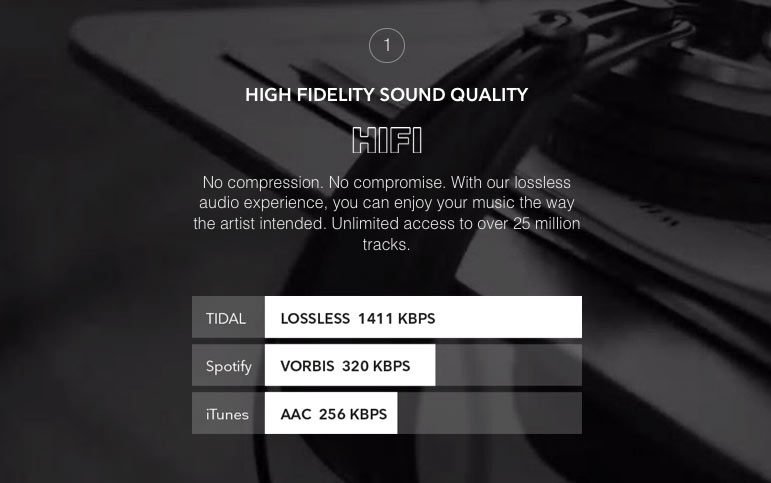New HiFi Streaming For US & UK Introducing Tidal
The Norway-based “High Fidelity” streaming music service WiMP is owned by Aspiro. The parent organization just announced plans to expand beyond Scandinavia (Sweden, Denmark, Norway, Germany and Poland) to the US and UK this fall…just in time to compete with Ponomusic and its download service. I wrote about WiMP some months ago and was not overly impressed. At least Tidal is not claiming the tracks are “high-resolution” but sticking with HiFi. You can read my previous post here. However, it must be working because the Aspiro Group has re-titled the service (avoiding WiMP in the US and UK is a good call) Tidal. You can visit the website and join their mailing list to get early access.
Figure 1 – The announcement page of the Tidal music service website.
The website claims that Tidal will be delivering “High Fidelity Music Streaming” as opposed to the 320 kbps .ogg files used by Spotify at their max quality level or iTunes’ AAC format at 256 kbps. The company boasts more than 25 million tracks at 44.1 kHz/16-bits, which have been encoded as FLAC files. FLAC is the same lossless encoding scheme that Ponomusic will be offering in October when they launch their download service. The catalog is rips of standard resolution CDs, which have a bandwidth of 1411 kbps (the FLAC files will be less than that but about 10-20%). No remastering or new analog transfers are being done. For all we know, they could be sourcing the same “High-Resolution” CD-rips that Omnifone is going to offer through Ponomusic.
The monthly cost will be around double what Spotify charges…$20 per month. Is the improvement in sound between a great quality .ogg vorbis encode and a FLAC file worth twice the cost? Not to me.
Tidal’s website states:
“No compression. No compromise. With our lossless audio experience, you can enjoy your music the way the artist intended. Unlimited access to over 25 million tracks.”
OK, I understand the promotional spin that’s needed to grab our attention but FLAC is a form of compression…so saying the music is not compressed doesn’t give me a great deal of confidence in their marketing people. It is a “lossless” compression technology but it’s still mucking around with the bits and there are audiophiles that insist FLAC suffers in comparison to pure PCM .wav files. I’m not one of those people.
Figure 2 – The audio format chart for Tidal [click to enlarge]
[NOTE: After I wrote and published this article, a reader pointed out that the illustration above is a graph that purports to show the tremendous advantage of Tidal over Spotify and iTunes. I didn’t even notice that it was a graph! But now that I know it is a graph…it’s misleading and wrong. The 1411 kbps is the bandwidth of a stereo Redbook CD (not a FLAC compressed file). The “fidelity” of a 320 kbps .ogg vorbis file is virtually the same as the ripped CD…so the bars should be practically the same length. And finally, AAC files from iTunes will sound pretty close as well. Thanks for pointing this out to me. Don’t be fooled, you probably aren’t going to notice the difference.
The inclusion of the now popular reference “to way the artist intended” is also a red herring. As I pointed out in my review of “The Distortion of Sound“, the Harman film on the causes of sound degradation, the artists say that they want to connect with their fans with the best possible fidelity. Kate Nash delivers the question at the end of the Harman film, “I don’t want my name associated with low quality things. If I were in control, I would want it to be the highest quality possible. I don’t understand why it isn’t, really. Why isn’t it? Who’s got the answer to that?”
But then when you download her (or the others) music and take a look at the dynamics and overall fidelity, the tracks are heavily compressed and sometimes painful to listen to. There is clearly a disconnect between what they think they’re producing and approving and the final result that iTunes or the CD-rip produces. This is not the way the artists intend their music to sound.
The Tidal catalog will be available for download as well as streaming. I would assume that they would have several levels of quality as WiMP does…after all it is the same company.
If we temper our real high-resolution expectations, I expect that Tidal will be very successful. It will be very challenging for average consumers to tell the difference between a good MP3 at 320 kbps and a FLAC file of the same CD, but audiophiles will feel better about it.
They will also be offering HD music videos…I should get in touch with them and offer up my catalog. I’ve got lots of tracks with HD-Video and HD-Audio.




I want to reply to a very narrow issue: lossless compression and “mucking around with the bits”. With digital signals here at Audio Precision we are often concerned with “bit accuracy”. Is every single bit in stream B exactly the same as in stream A? If so, there is no degradation. Full fidelity has been maintained.
In terms of bit accuracy, the lossless codecs we have tested (FLAC, Dolby TrueHD [Meridian Lossless Packing] and dts-HD Master Audio) perform perfectly. Every single bit out of millions and millions of bits is right there where it belongs, exactly the right number in exactly the right order. So the file size is “compressed”, but the audio assuredly is not. It is exactly the same as the PCM original. So I would be comfortable in terming a product that uses FLAC as a distribution format as “uncompressed”. Whether or not it was “compressed” before distribution is another question.
David Mathew
Audio Precision
I guess I would love to see some sort of descriptor that segregates uncompressed from losslessly compressed even if the bits are identical.
Been using WiMP HiFi for a while now – location Denmark.
I am quite content!
Only drawback is the missing ‘gapless playback’.
As long as I don’t know the origin of the files labelled as ‘highres’, I’ll stick to CD’s (ripped or physical) or FLAC-streaming.
MM
Have you compared the sound to the Spotify streams?
I’m surprised you didn’t jump on them for their graph. It gives the impression that the lossless 44/16 file is twice as good as the lossy 320 KBPS while your Fidelity/Resolution graph from the May 14 post shows that a 320 file can indeed be “near CD” quality.
As for Spotify quality, I am a longtime Spotify subscriber and I have made numerous listening comparisons of the 320 ogg vorbis files to my own ripped-from-CD FLAC files. I’d say your graph portrays the difference just about right. The CD does sound better, but not by that much. (Note: my setup streams the ogg files “bit perfect” from Spotify to the DAC and they sound real good. I believe most listeners have only heard Spotify that’s been processed by their computer’s sound mixer and then played through the computer’s sound card. That’s why you hear such varied reviews of Spotify sound quality. Even when streaming to an external DAC Spotify gives you no easy way to bypass the mixer. Also there is a large difference in sound quality between the Spotify desktop app and their web-based player. Depending on the player that Tidal implements they could easily have similar kinds of issues.)
I feel like an idiot…I didn’t notice that it was a graph of “relative” sound qualities! I’ll have to edit the post and fix that.
I have no problem with referring to FLAC files as uncompressed because in the audio domain, that is correct and it is 100% identical to the original (as you already know). File compression is a good thing for utilizing bandwidth efficiently.
Actually, I don’t have a problem with the graph either. It’s 100% factual. I agree that a 320Kbps file can yield excellent sound but it is an approximation of the real deal. Is FLAC four times better? I would say probably not but to some the point may be that marginally better is justification enough. It’s a subjective thing. At some point, people need to ask questions and understand the technology. Maybe even do some testing themselves to see if it is worth the extra money.
Finally, I suspect that many folks are not tuned into sound quality like most of us here are. There may be some artists not be overly concerned with compressed dynamics and may actually enjoy hearing some of the low level details a little more easily.
Mark,
I use dbpoweramp for ripping CD’s and there is an optional setting for “Uncompressed FLAC” as opposed to the mid-level setting of 5. I have tried it a few times but some music server’s do not like the uncompressed file so the setting of 5 is safer.
http://www.audiostream.com/content/dbpoweramps-flac-lossless-uncompressed-wish-come-true
I think the most important reason to download at the highest possible resolution has a lot to do with future-proofing your purchase rather than simply pure audio bliss.
If your current audio chain can reap the benefits then all the better as you are immediately getting the best of both worlds. However, it your present audio chain cannot reproduce the better sound you can easily downgrade the file to fit your current system. You will undoubtedly enjoy sound quality equal to or better than your other files but, most importantly, you still have the orginial high res file to fully enjoy when one eventually (inevitably?)moves to better audio gear.
I would agree with that but at what resolution do you stop gaining any benefit? Would you use 384 kHz/32-bits to do analog transfers?